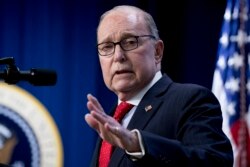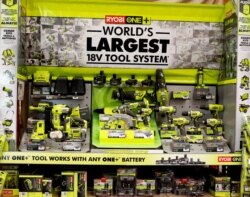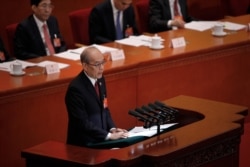Updated at 6:18 p.m. Aug. 2.
WHITE HOUSE — Amid worries of an escalating trade war with China, two key American stock indexes fell on Friday, posting their biggest weekly drops of the year.
The S&P 500 and Nasdaq lost 3.1 percent and 3.9 percent, respectively, this week, while the Dow Jones industrial average had its second-worst week of the year, slipping 2.6 percent.
President Donald Trump's surprise announcement the previous day to impose 10 percent tariffs on the remaining $300 billion worth of Chinese products that weren’t already subject to tariffs triggered uncertainty and fear among investors.
Trump administration officials contended markets were overreacting, insisting American consumers would not feel the pain of the higher tariffs.
"Economic burdens have fallen most heavily on China," National Economic Council Director Larry Kudlow told reporters Friday in response to a question from VOA. "They've had to slash prices to try to compete. That has done damage to their profits, their companies and their economy."
Americans will pay more
Economists predicted U.S. consumers would find themselves paying more for such items as cellphones, clothing and toys when shopping for Christmas and other holidays.
VOA asked Trump on Friday afternoon if he could assure Americans that they would not be paying more for those presents because of the new tariffs.
China's "currency is going to hell, but they're also pouring money in and that will totally pay for the tariffs," the president replied. "The tariffs are not being paid for by our people. It's being paid for by China."
The U.S. government charges importing companies, most of which — when it comes to products from China — are American companies or U.S.-registered units of foreign companies that import the goods.
"We're cooked," said Rick Helfenbein, president and chief executive officer of the American Apparel and Footwear Association. "Tariffs are taxes on American consumers."
Helfenbein and other association leaders have said manufacturers acknowledge that China cheats, and they have been long calling for a rules-based, enforceable trade agreement with China.
The Trump administration's latest tariff action will certainly get China's attention, according to National Association of Manufacturers President and CEO Jay Timmons. "But it also has the attention of manufacturing workers in the U.S. and their families, who are feeling the negative impact of the current tariffs and will be made even less competitive with this new tax on trade," he said.
China could create additional difficulties for American companies.
"They've put tariffs on all U.S. imports. I suppose they could raise those," said Simon Lester, the Cato Institute's associate director for trade policy studies. "There are a lot of U.S. businesses which operate there, and their lives could be made more difficult through a number of regulatory mechanisms."
Asked how China might retaliate, Kudlow replied, "I just don't want to speculate on what the other side might do."
Ready to fight
Chinese officials reacted strongly Friday.
"China's position is very clear that if U.S. wishes to talk, then we will talk, if they want to fight, then we will fight," China's new ambassador to the United Nations, Zhang Jun, told reporters Friday at U.N. headquarters.
Trump announced Thursday that trade talks between China and the United States would resume in Washington next month, but he was imposing, from Sept. 1, the new import taxes on top of the 25% tariff he ordered earlier on about $250 billion worth of goods from China.
In making the announcement, Trump accused Beijing of not living up to its promises to purchase more American agricultural products and halt the flow of opioid fentanyl to the United States.
"If I wanted to, I could increase it to a very much higher number," Trump said Friday about the percentage of the tariffs.
Lester, at the Cato Institute, said he saw a flaw with the Trump administration's trade approach.
"They're taking on the whole world at once," he said. "They're attacking the EU, they're attacking Japan, they're attacking Mexico, they're attacking Canada at various times. And that makes it difficult really to focus on China."
It also prevents the administration, Lester said, from making a coordinated effort with allies to approach Beijing and pressure it to change its trade practices.
Trade talks
Trump's latest salvos came after the latest round of trade talks between U.S. and Chinese negotiators ended in Shanghai.
U.S. and Chinese representatives held talks at a working dinner Tuesday and four hours of negotiations Wednesday before the U.S. delegation headed straight to the airport.
Shortly after U.S. negotiators’ arrival in Shanghai, Trump warned China against negotiating a deal after the 2020 U.S. presidential election, declaring that a delayed agreement would be less attractive than a deal reached in the near term.
The world's two largest economies have been engaged in an intense trade war that has dragged on for more than a year, having imposed punitive tariffs on each other on more than $360 billion in two-way trade.
The Shanghai negotiations came after Trump and Chinese President Xi Jinping agreed at June's Group of 20 summit to resurrect efforts to end the costly trade war over China's technology ambitions and trade surplus.
















